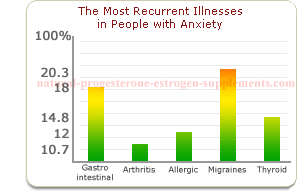34 MENOPAUSE SYMPTOMS |
HEALTH CENTER |
|
LEARN MORE |
|||||||||||||||||||||||||||||||||||||||||||||||
| Menopause | |||||||||||||||||||||||||||||||||||||||||||||||
| Symptoms | |||||||||||||||||||||||||||||||||||||||||||||||
| Herbs for Menopause | |||||||||||||||||||||||||||||||||||||||||||||||
|
|||||||||||||||||||||||||||||||||||||||||||||||
|
|||||||||||||||||||||||||||||||||||||||||||||||
|
|
Anxiety May Cause Physical Problems |
|
Medical and Psychiatry Researchers of the University of Manitoba in Winnipeg, Canada, has recently published a new multinational study which suggest that anxiety disorders increase the risk of physical problems and negatively affect quality of life. As well, the severity of the physical illness and any loss of function as a result are worsened among those who also have an anxiety disorder. |
|
a medical interview conducted by a primary care physician, blood pressure measurements and blood and urine samples. Psychiatric interviews were conducted by a psychologist or physician, who used criteria from the Diagnostic and Statistical Manual of Mental Disorders, Fourth Edition (DSM-IV) to detect anxiety disorders. During the investigation, Dr. Sareen realized that anxiety disorders were associated significantly with physical problems such as respiratory diseases, gastrointestinal diseases, arthritis, allergic problems, migraine disease and thyroid diseases. |
 |
Also, the investigation had the following conclusions:
Written by: Natural-Progesterone-Estrogen-Supplements.com
Sources: (2006) Sareen, Jitender, et al. "Disability and Poor Quality of Life Associated With Comorbid Anxiety Disorders and Physical Problems." JAMA N° 166. |
| Back to Home: | 34 Menopause Symptoms |  |
